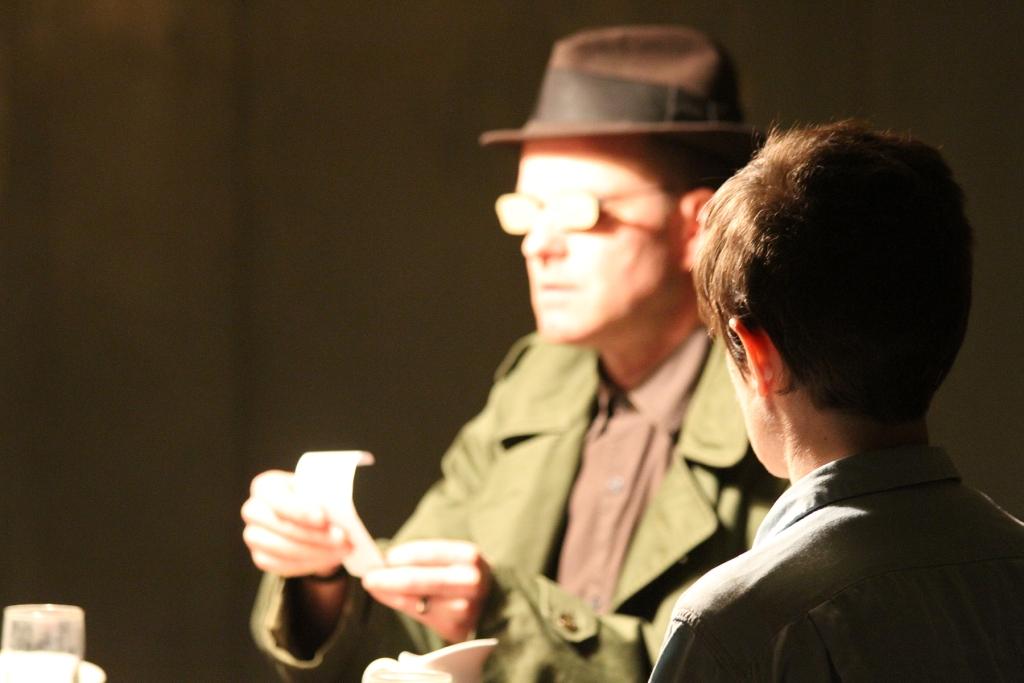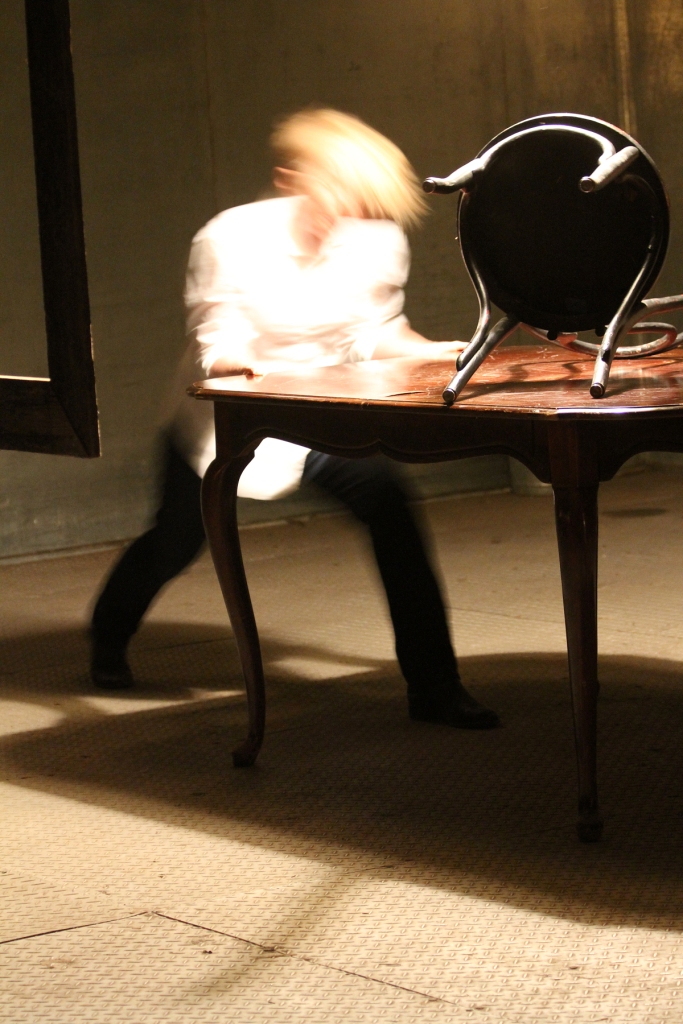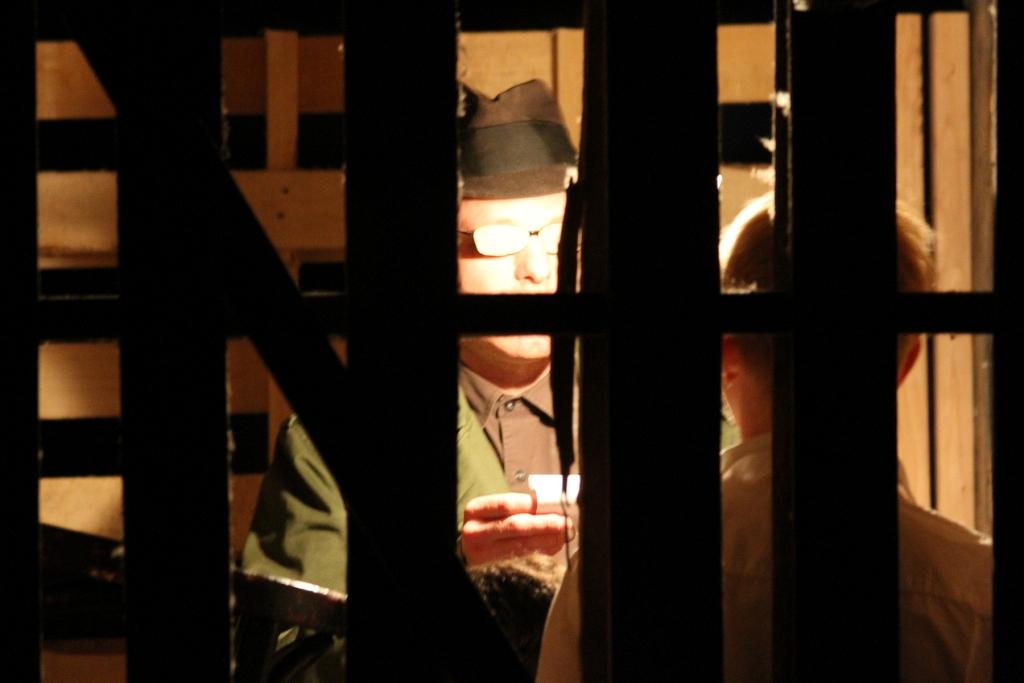A Double-Dip Into “Black Water” – Lightsey Darst
The second of two critical takes on Skewed Visions' BLACK WATER. Lightsey Darst offers up a more experiential approach to the show, with a poetic, play-by-play dispatch on what it felt like to be in the audience for this unique performance.



PITCH BLACK. SO BLACK THAT WHEN YOU SHUT YOUR EYES it’s the same. Who is near? You know they’re there. Can you touch them? Is this space vast or tiny? Are we in danger? Are we suffering?
Matchlight — you see the metal ceiling with its sick unlit lamps, metal walls, rivets, the floor, quick, before it goes out again. A walk-in freezer, then. More tedium than horror really, but that doesn’t matter: In the collective imagination, nothing good ever happened in a walk-in freezer. We should get out of here. We can’t get out of here. Pitch black.
Another match — you might be in the hull of the Titanic, straining rivets, imminent crush. We are miles and miles under, we are inside, deep. What is he saying, this man in the corner, this man in the trenchcoat and the fogged-out frames? Pay attention. This is happening, here, now, to you.
What is it about now — even, for example, that we can believe in it: This, here, now, this / absolute / moment / in which you are reading this, here, now. Did you notice it? Is it gone?
But is this now: Beckett, Baudrillard, Sebald, the angel of history? “Where we perceive a chain of events, he sees one single catastrophe which keeps piling wreckage upon wreckage and hurls it in front of his feet. The angel would like to stay, awaken the dead, and make whole what has been smashed. But a storm is blowing from Paradise” (Walter Benjamin). This emasculated viewer, this eunuch recorder, is yesteryear; this year we don’t care, this year we’re throwing up our hands, saying, Look, we tried, we elected a Black president, and things are still awry! What can we do?
But now: Two other people set a table; a frame, distressed, hangs from the ceiling, to look through. The frame reminds you of all you brought with you, of your real self, encumbered with past, incapable of swift and total change — reminds you of the regime you are and the change you aren’t.
In brighter light, now you see the character in the corner’s glasses aren’t fogged after all; they’re covered with what might be adhesive bandages: eye-wounds, shields for the place where a hurt went in to heal. What he sees isn’t here. This metaphor crumbles under its own weight. He keeps talking, echo, detritus, scrap, fragment, slag-heap, detail, cast-off. In the woods behind the house was a place where four or five appliances lay on their sides and backs, doors open, as if the house had simply dissolved around them. Lost, stripped, alone. High and mighty, I am set naked on your shore.
Was that your house; was that your treasure in the heart?
He opens his mouth and lets out a drone of “A”s, longer than it seems breath could run. A drone: a male bee; to resound or roar; to drowse. He doesn’t move, his gray face doesn’t show effort. You can’t see his eyes; he might not be in there. Later, you’ll remember this eeriest moment.
Detail: On the table, a vase, two withered sprigs of lily of the valley.
Then, a flap, a flutter. You’re led. You follow. Something like a haircut is happening in a box made of pallets; you peer through slats at one person examining another, looking, seemingly, for where a cut might be made; you peer through slats at other people peering in. When a door opens, you’re surprised it’s still light out — how quickly you get used to everything. Follow the stranger up the street. “We’re trying to get these houses bombed.” “Power must be abolished.” Yes, all right. But this is University Avenue, where the light rail is going in, and it’s May and lovely out, and how can you care about people at such distance? They made the mistake of being born on the wrong side of power, while you soak in its sleepy backwash. “Now you must fight against everything that wants to help you.” But you don’t need help.
Or do you? You’re indoors again. Freedom doesn’t last long. The stranger curls up in bed, then he’s up, finding messages in an unfurling roll of paper towels. Two others, done perching in tableau vivant (or is it mourant?) now push their chairs out of the room — not roughly, not tenderly, but as if the chairs are unfunctioning parts of themselves, dead or sleeping limbs.
And now something terrifying is supposed to happen: A drone will fly in and show you that you, too, can be seen impersonally, from a distance, cross-haired. Only it doesn’t –the flying fright isn’t working right tonight, so instead a guy walks in holding this weird device above his head like a technological halo, walking around facing you and humming. “Go down into the maelstrom mute.”
______________________________________________________
Now you see the character in the corner’s glasses aren’t fogged after all; they’re covered with what might be adhesive bandages: eye-wounds, shields for the place where a hurt went in to heal. What he sees isn’t here.
______________________________________________________
Aftermath: A loading bay opens onto dusk, silhouetting a room full of wooden chairs of different styles, at angles, a few dangling just above the ground (though it takes you a moment to recognize this), and at the far end, a table and two chairs rising on stems. Whether they are playfully surreal or frozen at the moment of impact (now), it’s hard to say.
The man with the bandaged lenses, your blind guide, picks his way through the chairs, taking up some as he goes, making a cage of them around his head and shoulders, as if he were some vulnerable crustacean, just having grown and cobbling together his new safe place. Armor or struts, they complicate his outline, they make him strange; they are his technology and his burden. His reaching hand can barely take hold of the last one, but you see it dark against light, outstretched.
So, now it’s over and you’re back in your own. What happened? What does it matter? Do you care more for strangers than you did 45 minutes ago? Probably not. Still, you find you care for your own imagination — that it not be annihilated, that it be fed, that it find just such material as this to grow on. Why or whether that matters is hard to say. Many people, you know, would rather be flattened, silenced, snuffed out by their entertainments; why should you protect this little seed of vision? Why should you work so hard to see when the drones can do it for you?
______________________________________________________
Author’s notes:
May 10, 2012: Skewed Visions’ Black Water
The man/guide/stranger is Charles Campbell; Megan Mayer and Laurie Van Wieren are the two others. Most quotations come from the text of the play, which is Charles Campbell’s collage/creation. Black Water’s design is by Irve Dell.
As mentioned above, the drone malfunctioned the night I attended. Presumably, it normally works.
______________________________________________________
Related performance details and links:
Black Water by Skewed Visions runs through June 2, showing Thursday – Saturday evenings at 8 pm in the empty storefront (formerly home to Mediterranean Market) at 2264 University Avenue, St. Paul. Tickets and additional info: http://www.skewedvisions.org/2012/05/black-water/
______________________________________________________
About the author: Originally from Tallahassee, Lightsey Darst is a poet, dance writer, and adjunct instructor at various Twin Cities colleges. Her manuscript Find the Girl was recently published by Coffee House; she has also been awarded a 2007 NEA Fellowship.